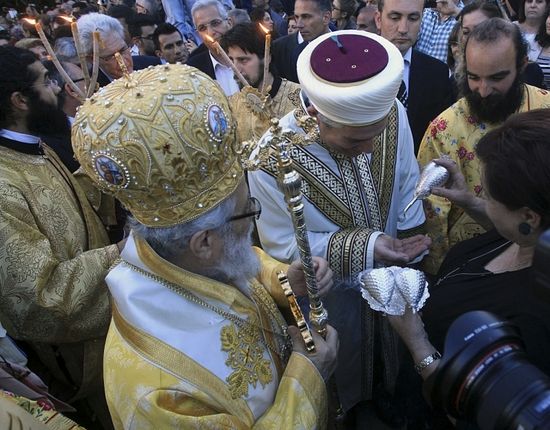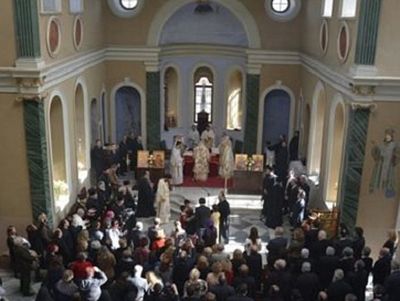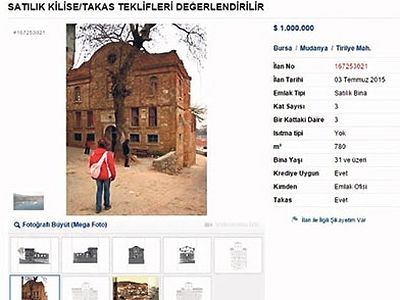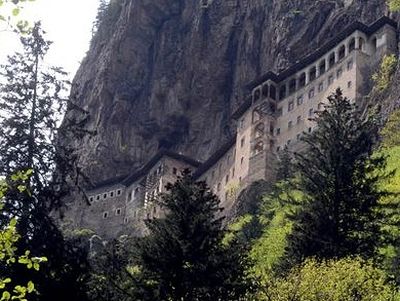August 20, 2015
 A Greek Orthodox bishop and an Islamic cleric attend a Good Friday liturgy at the Church of St. George Exorinos in Famagusta, northern Cyprus, April 18, 2014. Hundreds of Greek Orthodox pilgrims, some coming home after 40 years of forced exile, commemorated the crucifixion of Jesus in a rare Good Friday service in northern Cyprus on Friday. Held in this medieval walled city in the Turkish part of the divided island, the ceremony at the 14th-century St. George Extorinos church was the idea of local authorities who invited the faithful from the Greek part of the island to visit.PHOTO: REUTERS / ANDREAS MANOLIS
A Greek Orthodox bishop and an Islamic cleric attend a Good Friday liturgy at the Church of St. George Exorinos in Famagusta, northern Cyprus, April 18, 2014. Hundreds of Greek Orthodox pilgrims, some coming home after 40 years of forced exile, commemorated the crucifixion of Jesus in a rare Good Friday service in northern Cyprus on Friday. Held in this medieval walled city in the Turkish part of the divided island, the ceremony at the 14th-century St. George Extorinos church was the idea of local authorities who invited the faithful from the Greek part of the island to visit.PHOTO: REUTERS / ANDREAS MANOLIS
The opening of the Church of Panagia Galakdodrofousas in Palekythro, in the Turkish northern part of Cyprus, after 41 years, is seen as a crucial reconciliation gesture on the divided island.
The World Council of Churches has hailed the opening of the church in the Turkish sector of the divided island where Islam has dominated for four decades as "an important sign of peace and reconciliation."
The church opened its doors to worshippers on August 16, the Office of the Religious Track of the Cyprus Peace Process, under the auspices of the Embassy of Sweden said in a statement.
Imam Fuat Tosun brought greetings of peace from the mufti of Cyprus and welcomed Christian worshippers in Greek at a Sunday service on Aug 16.
"God will help both Christians and Muslims to work together to achieve peace in Cyprus and we should continue our joint efforts in this regard," the Muslim cleric said.
The Church of Panagia ((Virgin Mary), built in 1896, had been closed for worship from 1974 following a coup d'état on the island by pro-Greece forces that led to a Turkish military invasion and eventually a ceasefire.
With the ceasefire a United Nations-patrolled buffer zone divided the island into two ethnically separated portions.
The Greek and Turkish Cypriot leaders are currently engaged in active negotiations under U.N. auspices for a comprehensive settlement.
Cyprus is an island divided for more than 40 years now and was in 2014 called "a station for the pilgrimage of justice and peace" by WCC general secretary Rev. Olav Fykse Tveit.
Since the Turkish invasion of Cyprus in 1974 partitioned the island, the northern third has been inhabited by Turkish Cypriots and the southern two-thirds by Greek Cypriots.
United Nations peacekeeping forces estimate around 165,000 Greek Cypriots fled from the north to the south at the time of the invasion, and 45,000 Turkish Cypriots from the south to the north.
The Turkish invasion caused massive destruction, with 6,000 soldiers and civilians killed (two percent of the male population in 1974).
Another 1,619 men and women, of whom 1,536 were Greek Cypriots and 83 Greeks, never returned home and were recorded as missing.
Since 1983 the Turkish-held area has declared itself the Turkish Republic of Northern Cyprus, recognized only by Turkey, which keeps more than 30,000 troops in the north of the island.
The liturgy celebrated by Bishop Porfyrios of Neapolis on Aug. 16 gathered some 400 worshippers from the village of Palekythro.
IMAM FUAT TOSUN
Imam Fuat Tosun, regional mufti of Kyrenia, represented Dr. Talip Atalay, mufti of Cyprus.
Salpy Eskidjian Weiderud represented the Office of the Religious Track of the Cyprus Peace Process.
Bishop Porfyrios reiterated the appreciation of Archbishop Chrysostomos II of the Church of Cyprus to the mufti for his personal attention and intervention in favor of Sunday worship.
This had been rejected by the Turkish Cypriot authorities in earlier years.
"The religious leaders of Cyprus are committed to continue to dialogue and work together for religious freedom, human rights and peace, with the support of the Embassy of Sweden.
"We are grateful to the Office of the Religious Track for their role in today's worship and their constant facilitation of the religious leader's dialogue for peace," said Porfyrios.
The bishop reminded the worshipers that they should lose neither hope nor faith: "With the help of God peace is possible and we should all work towards that end."
The WCC said in its statement that along with its churches in Cyprus it has long been engaged in promoting dialogue between Turkish Cypriot and Greek Cypriot leaders, as well as reunification of the island and its people.
In May, the WCC issued a statement welcoming the resumption of peace talks on Cyprus.
WCC general secretary Tveit called for prayers in support of dialogue to "find a way to overcome previous antagonisms and disappointments, and shape an undivided and peaceful future for the people of Cyprus."
The WCC brings together more than 500 million Christians worldwide representing Anglican, Orthodox and Protestant Christians from many traditions and denominations.
The Roman Catholic Church is not a member of the WCC but it cooperates it at many levels with the Geneva-based Christian grouping and serves on some its committees.



